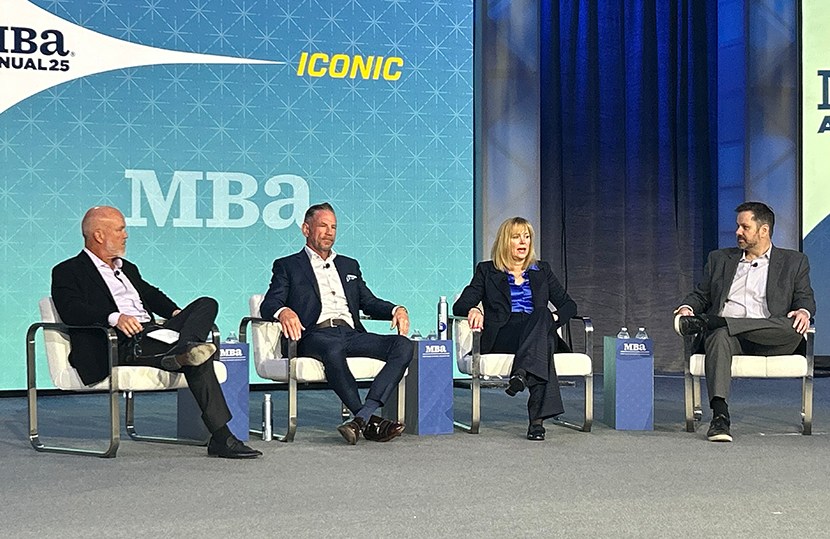
Industry Panel Tackles AI, Customer Experience

(From left: Bill Emerson, John Hedlund, Terry Schmidt and Brian Woodring, by Anneliese Mahoney)
LAS VEGAS–What impact will AI have on the mortgage banking industry? Is it a bubble? How does it fit into the customer experience?
Those were just some of the questions a panel of industry leaders discussed during a session titled “Market Innovation and Transformation” during the Mortgage Bankers Association’s Annual Convention and Expo Oct. 21.
Brian Woodring, chief information officer at Newrez, noted that AI is currently 80% hype, and 20% reality, but the “reality is promising, it’s exciting.”
“I do think it’s a bubble,” Woodring said. “I also, at the same time, think that the most important companies of the next 20 years are being created right now.” He compared it to the internet bubble–there were companies that didn’t survive, but the end result was entirely transformative.
And it’s being used effectively by the panelists’ various companies.
“We are using it everywhere,” Woodring said. “We look at it as full spectrum across the entire lifecycle, everything from predictive analytics in the marketing space through underwriting and processing, through audit, QC. There’s an opportunity anywhere there is what I call ‘digital paperwork.’ ”
“It’s happening faster than we ever thought. And the Gen AI, that’s real,” said Terry Schmidt, CEO and director of Guild Mortgage Co. We “created our own–what we call Guild IQ. And that system just keeps getting smarter and smarter and better and better and more accurate.”
Panel moderator Bill Emerson, president of Rocket Cos., said he views automation and AI as allowing tech to do what it does best and allowing humans to do what they do best–namely communication and relationship building.
John Hedlund, vice chairman of ICE Mortgage Technology and 2026 MBA vice chairman, said figuring out exactly how and when to implement AI remains a challenge for companies.
“It’s time-consuming, and you’re locked into it, and so separating the wheat from the chaff out there today, I think it’s very difficult for leaders making those decisions,” Hedlund said.
“It shouldn’t just be, ‘I want AI for AI’s sake.’ What is my business use case? And is AI the best solution today, given that it’s newer, or is there other digitization or automation that is actually better today?” Hedlund said. “I think it needs to be thoughtful.”
Another concern for any company looking at new technology–whether AI or something else–is balancing customer experience with efficiency and best practices.
Schmidt pointed to the importance of data privacy. “You want your customers to be able to trust you,” she said. You “want them to come back to you and making sure that their data is private is really, really critical.”
“To me, the art of designing a digital experience is really balancing trust, right? Everyone wants to the process to be faster, cheaper, more streamlined, better,” Woodring said. But, with so much data available in the current environment, it’s critical to make sure you’re not violating customer trust in order to make certain processes more convenient, he said.
“There’s no exact correct point. I think it’s going to be different for every mortgage company and every scenario, but it is that constant balance,” he said.
Emerson asked the panelists how they thought technology in the industry would look in five years, revealing a good amount of optimism among the industry leaders.
“More AI, more automation,” Hedlund said. “Hopefully we’re getting the benefits that we’ve been working on out of the system and the lenders are more efficient, more scalable, more focused.”
But, he doesn’t think it’s going to look like something out of The Jetsons, and that a lot of change will be “incremental.” “This stuff is hard to do, it’s hard to implement. And there’s going to be some surprises, there’s going to be some that don’t work, and some successes and some wins,” Hedlund said.
“I think it’s going to be difficult for companies that don’t get on the bandwagon, and quickly, to continue to be competitive,” Schmidt said.
“I think we’ll have some real productivity gains from AI that are measurable,” Woodring posited. “Might take a couple of years, but they’re going to start to roll in. So you might even see cost of service and origination decrease for the first time in…I can’t remember.”
Emerson said he thinks that tech and AI might be able to help with some of the other industry challenges as well, such as housing affordability.
“I think we look at a completely different landscape five years from now,” he said. “I hope I’m right.”
